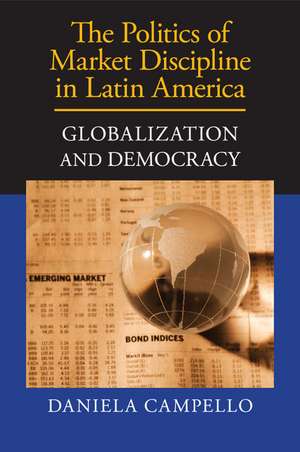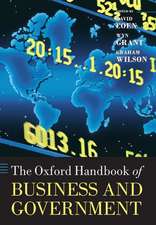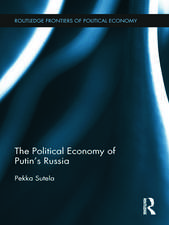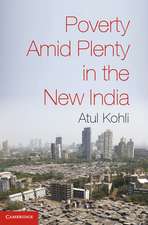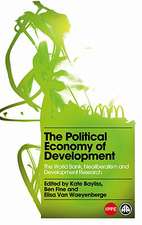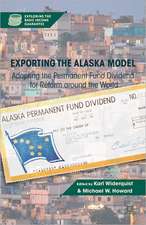The Politics of Market Discipline in Latin America: Globalization and Democracy
Autor Daniela Campelloen Limba Engleză Paperback – 20 ian 2016
| Toate formatele și edițiile | Preț | Express |
|---|---|---|
| Paperback (1) | 283.25 lei 6-8 săpt. | |
| Cambridge University Press – 20 ian 2016 | 283.25 lei 6-8 săpt. | |
| Hardback (1) | 693.69 lei 6-8 săpt. | |
| Cambridge University Press – 15 apr 2015 | 693.69 lei 6-8 săpt. |
Preț: 283.25 lei
Nou
Puncte Express: 425
Preț estimativ în valută:
54.20€ • 56.70$ • 45.02£
54.20€ • 56.70$ • 45.02£
Carte tipărită la comandă
Livrare economică 03-17 aprilie
Preluare comenzi: 021 569.72.76
Specificații
ISBN-13: 9781107649866
ISBN-10: 1107649862
Pagini: 254
Ilustrații: 65 b/w illus. 21 tables
Dimensiuni: 154 x 230 x 14 mm
Greutate: 0.35 kg
Editura: Cambridge University Press
Colecția Cambridge University Press
Locul publicării:New York, United States
ISBN-10: 1107649862
Pagini: 254
Ilustrații: 65 b/w illus. 21 tables
Dimensiuni: 154 x 230 x 14 mm
Greutate: 0.35 kg
Editura: Cambridge University Press
Colecția Cambridge University Press
Locul publicării:New York, United States
Cuprins
1. Globalization, democracy, and market discipline; 2. Between votes and capital: redistribution and uncertainty in unequal democracies; 3. Investors' 'vote' in presidential elections; 4. The politics of currency booms and crises: explaining the influence of the investors' 'vote'; 5. Currency crisis, policy switch, and ideological convergence: presidential elections in Brazil; 6. Exogenous shocks and investors' political clout: presidential elections in Ecuador; 7. Controlling for incumbency: financial markets' influence in Chávez's Venezuela; 8. 'Vivir con lo nuestro': default and market discipline in Argentina; 9. Who governs?: market discipline in the developed world; 10. Conclusion.
Recenzii
'Daniela Campello tackles a very controversial and perhaps most misunderstood topic in the political economy of contemporary Latin America: to what extent do global markets and foreign investors constrain governments, particularly those on the left, preventing them from pursuing redistributive policies voters demand? Her answer is sophisticated and unexpected. The book is a lasting contribution to understand globalization, the emergent left, and the politics of policy making not only in Latin America but elsewhere in the developing world.' Alberto Díaz-Cayeros, Stanford University, California
'It is widely recognized that financial markets discipline governments and induce even leftist rulers to adopt conservative, pro-investor policies. In this impressive book, Daniela Campello breaks new ground by explaining how and why this market discipline varies across countries and over time in Latin America. Campello supports her arguments through a rigorous set of formal models, statistical tests, and comparative case studies, setting a new standard for future scholarship on the politics of market discipline.' Kenneth M. Roberts, Cornell University, New York
'Campello's book will reshape our understanding of currency crises and their role in policy making, in Latin America and beyond. It traces the ebb and flow of conservative and radical policies to the relative availability of hard currency, itself a product of international commodity prices and interest rates, and in so doing forces us to rethink the incentives and constraints facing policy makers in a globalized world. This is an impressive and important book that will become a game-changer for the study of Latin American political economy and a necessary reference for the study of international political economy in developing countries more generally. By reshaping debates over the agency of politicians, given exogenous economic shocks, it will become a crucial piece in our understanding of policy studies more generally.' Maria Victoria Murillo, Columbia University, New York
'The widespread expectation is that capital mobility constrains the policy choices of elected governments, but Daniela Campello's lucid new book tells us precisely when and where mobile capital limits options for economic policy makers, especially those on the left. The theory is nuanced and compelling and should travel well beyond Latin America. This book is indispensable reading for everyone interested in the effects of globalization and the limits to democratization and redistribution in developing countries.' Ben Ross Schneider, Ford International Professor of Political Science, Massachusetts Institute of Technology
'It is widely recognized that financial markets discipline governments and induce even leftist rulers to adopt conservative, pro-investor policies. In this impressive book, Daniela Campello breaks new ground by explaining how and why this market discipline varies across countries and over time in Latin America. Campello supports her arguments through a rigorous set of formal models, statistical tests, and comparative case studies, setting a new standard for future scholarship on the politics of market discipline.' Kenneth M. Roberts, Cornell University, New York
'Campello's book will reshape our understanding of currency crises and their role in policy making, in Latin America and beyond. It traces the ebb and flow of conservative and radical policies to the relative availability of hard currency, itself a product of international commodity prices and interest rates, and in so doing forces us to rethink the incentives and constraints facing policy makers in a globalized world. This is an impressive and important book that will become a game-changer for the study of Latin American political economy and a necessary reference for the study of international political economy in developing countries more generally. By reshaping debates over the agency of politicians, given exogenous economic shocks, it will become a crucial piece in our understanding of policy studies more generally.' Maria Victoria Murillo, Columbia University, New York
'The widespread expectation is that capital mobility constrains the policy choices of elected governments, but Daniela Campello's lucid new book tells us precisely when and where mobile capital limits options for economic policy makers, especially those on the left. The theory is nuanced and compelling and should travel well beyond Latin America. This book is indispensable reading for everyone interested in the effects of globalization and the limits to democratization and redistribution in developing countries.' Ben Ross Schneider, Ford International Professor of Political Science, Massachusetts Institute of Technology
Descriere
This book uses a multi-method approach to challenge the notion that financial markets exert a broad influence over economic policy making in emerging economies.
